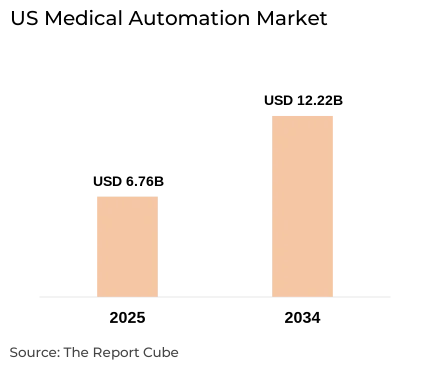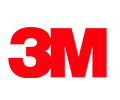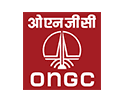
Understand The Key Trends Shaping This Market
Download Free SampleUS Medical Automation Market Insights and Outlook (2026–2034)
The US Medical Automation Market is anticipated to register a CAGR of around 6.8% during the forecast period, 2026-34. Additionally, the market size was valued at nearly USD 6.76 billion in 2025 and is projected to reach nearly USD 12.22 billion by 2034. the market is undergoing a transformative shift, driven by technological innovation, evolving patient expectations, policy reforms, and data-driven care models. This report provides a qualitative perspective to assist stakeholders in identifying emerging opportunities and making strategic decisions within the industry landscape.
Highlights include:
- The US Medical Automation Market is expected to grow at a rate of about 6.8% each year from 2026 to 2034.
- In 2025, the market was valued at nearly USD 6.76 billion.
- By 2034, it is projected to reach around USD 12.22 billion.
- The rising need for accurate, affordable healthcare is pushing automation forward.
- Breakthroughs in AI and robotics are transforming surgeries and driving market growth.
- The shift to telemedicine and remote patient monitoring is boosting automation adoption.
US Medical Automation Market Scope: Overview and Strategic Focus
This report broadly addresses:
- An overview of the US Medical Automation Market landscape, structure, and evolution
- Core segments, applications, and strategic developments shaping the industry
- High-level qualitative insights to support executive and policy-level decision-making
US Medical Automation Market Dynamic (2026–2034): Overview
The US Medical Automation Market is influenced by ongoing technological integration, changing care delivery models, and strategic shifts across the ecosystem. Organizations are focusing on innovation, collaboration, and adaptive business models to stay resilient and competitive in a rapidly evolving environment.
Market Drivers:
- Technological Advancements Enabling Innovative Healthcare Solutions: The integration of AI, IoT, telemedicine, and digital twin technologies enhances diagnostics, predictive modeling, and treatment precision across healthcare facilities.
- Expanding Adoption of Healthcare IT Solutions: Growing acceptance of digital health platforms, EHR systems, and remote patient monitoring solutions improves accessibility and quality of care.
- Strategic Collaborations & Research Initiatives: Partnerships among healthcare providers, tech firms, and governments foster innovation, enabling new product development and market expansion in the healthcare technology sector.
Major Challenges:
-
Stringent Regulatory Frameworks: Compliance with HIPAA, FDA, and regional health data protection standards increases operational complexity and implementation costs.
- Intensifying Competition: Both established medical technology leaders and emerging healthtech startups are competing for market share, pressuring pricing and innovation cycles.
- Evolving Patient Expectations: The shift toward personalized and preventive care demands faster innovation and agile responses from healthcare providers and technology developers.
Market Trends & Opportunities:
-
Digital Transformation in Healthcare: Accelerating use of AI, automation, and advanced analytics for clinical decision-making and hospital management drives efficiency and cost reduction.
- Patient-Centric Healthcare Models: Increased focus on tailored treatments, remote engagement, and improved patient experiences enhances service delivery and satisfaction.
- Sustainability & Green Healthcare: Emphasis on environmentally responsible operations, energy-efficient medical equipment, and ethical sourcing strengthens brand reputation.
- Emerging Opportunities: Expanding applications of digital twin technologies, telehealth, genomics, and predictive analytics present significant growth potential across the global healthcare sector.
Impact of Artificial Intelligence (AI) on the US Medical Automation Market
AI continues to redefine the US Medical Automation Market by transforming patient care, administrative efficiency, and research capabilities. Its role extends across clinical, operational, and strategic dimensions:
- Process Optimization: Streamlining XX workflows and clinical operations
- Enhanced Decision-Making: Leveraging predictive analytics and diagnostic intelligence
- Innovation Acceleration: Driving discovery in medical research and personalized medicine
- Patient Experience: Enabling tailored XX solutions and improved engagement
Organizations integrating AI responsibly and strategically are expected to strengthen outcomes, efficiency, and patient value across the XX continuum.
Competitive Landscape: Largest US Medical Automation Market Companies by 2034
The US Medical Automation Market is expected to see major structural evolution through advances in medical technology, health data platforms, and integrated service models. Leading players will shape the future of XX through innovation, partnerships, and expanding coverage across global and regional markets.
Key themes include:
- Innovation and Technology Integration: Advancements in digital health, medical devices, and biotechnology
- Strategic Partnerships: Collaborations across XX systems, life sciences, and technology sectors
- Global and Regional Expansion: Extending services across established and emerging US Medical Automation Markets
- Emerging Players: New entrants contributing agile, specialized, and patient-focused solutions
Insights for Decision-Makers
- What is the current state of the US Medical Automation Market?
- What are the key trends shaping the US Medical Automation industry?
- Which factors are influencing growth in the US Medical Automation Market?
- What challenges exist for organizations within the US Medical Automation sector?
- How is technology, including AI, impacting the US Medical Automation industry?
- Who are the leading players or innovators within the US Medical Automation Market?
- What opportunities exist for new entrants and investors in the US Medical Automation sector?
- How is patient behavior and demand evolving?
- What regional or demographic factors influence the US Medical Automation Market?
- Where can businesses access detailed insights on the US Medical Automation Market?
- What recent innovations are influencing future US Medical Automation market?
Table of Contents
- Introduction & Methodology
- Study Objectives and Scope
- Key Study Variables
- Secondary Data Sources
- Primary Data Collection Summary
- Companies Interviewed for Primary Research
- Executive Summary & Market Dynamics
- Summary of Market Drivers and Challenges
- Opportunity Assessment Matrix
- Key Recent Developments in US Medical Automation Market
- Summary of Relevant Policies and Regulations
- US Medical Automation Market Scope
- Market Definition and Segmentation
- Core Applications and End-User Sectors
- Regional and Country Coverage
- Research Methodology and Approach
- 2. US Medical Automation Market Dynamic
- US Medical Automation Market Growth Drivers
- US Medical Automation Industry Challenges
- Emerging Opportunities
- Implications for Stakeholders
- US Medical Automation Market Trends and Insights
- Digital Transformation Across Sectors
- Consumer Behavior Patterns
- Sustainability and Regulatory Impact
- Forecasted Trends and Growth Areas
- Regional and Country-Level Insights
- Regional Market Overview
- Country-Level US Medical Automation Market Sizes and Shares
- Comparative Regional Analysis
- Opportunities and Challenges by Region
- AI Impact on US Medical Automation Market
- Adoption of Emerging Technologies
- AI and Data-Driven Insights
- Innovation in Products and Services
- Enhancing Customer Experience
- Competitive Landscape
- Key Players
- Partnerships, Collaborations, and Alliances
- Emerging Players and Disruptors
- US Medical Automation Market Share, Positioning, and Benchmarking
- Key Business Segments and Strategic Alliances
- Quantitative and Qualitative Research Insights
- US Medical Automation Market Overview Based on Research Findings
- Key Observations and Patterns
- Emerging Opportunities and Threats
- Recommendations for Strategic Decisions
- Decision-Maker Guidance and Strategic Questions
- Drivers of Growth and Adoption Patterns
- Challenges and Barriers in the Market
- Technology and AI Influence
- Competitive Positioning and Benchmarking
- Opportunities for New Entrants and Investors
- Regional Dynamics and Considerations
- Insights for Client-Specific Reports
- Forecasting, Innovation, and Future Outlook
- US Medical Automation Market Forecasts (2026-2034)
- Emerging Technologies and Innovations
- Future Opportunities and Risks
- Actionable Recommendations
List of Figure
Figure 1: Opportunity Assessment Matrix
Figure 2: Key Developments in the US Medical Automation Market (Timeline)
Figure 3: Market Segmentation Overview
Figure 4: US Medical Automation Market by End-Use Sector
Figure 5: Regional Coverage Map
Figure 6: US Medical Automation Market Growth Drivers (Infographic)
Figure 7: Challenges vs Opportunities in the US Medical Automation Market
Figure 8: Impact of Digital Transformation by Industry
Figure 9: Sustainability Influence on Consumer Behavior
Figure 10: Forecasted Trends to 2034
Figure 11: Regional Market Size Comparison
Figure 12: Country-Level Market Share (Top 5 Countries)
Figure 13: AI Adoption Across Industries
Figure 14: AI-Driven Innovation Roadmap
Figure 15: Competitive Landscape Map
Figure 16: Market Positioning of Key Players
Figure 17: Research-Based US Medical Automation Market Overview
Figure 18: Emerging Opportunities vs Threats Matrix
Figure 19: Strategic Questions for Decision Makers
Figure 20: US Medical Automation Market Forecast, 2026-2034
Figure 21: Innovation Impact Matrix
List of Table
Table 1: Summary of Primary and Secondary Data Sources
Table 2: Companies Interviewed for Primary Research
Table 3: Summary of Market Drivers and Challenges
Table 4: Regulatory Policies Relevant to the Market
Table 5: US Medical Automation Market Segments and Definitions
Table 6: Core Applications by End-User Sectors
Table 7: Drivers and Their Relative Impact
Table 8: Industry Challenges by Region or Sector
Table 9: Consumer Trends Across Demographics
Table 10: Regional Market Size and CAGR
Table 11: Country-Level Market Share Breakdown
Table 12: Key Players and Strategic Moves
Table 13: Emerging Players Overview
Table 14: Market Share Benchmarking - Top 10 Companies
Table 15: Summary of Research Findings
Table 16: Strategic Observations by Segment
Table 17: Guidance Summary for Key Stakeholders
Table 18: Forecasted Market Size (2026-2034)
Table 19: Innovation Pipeline - Major Technologies
Top Key Players & Market Share Outlook
- Roche
- Cognizant Technology Solutions
- Philips Healthcare
- Stryker Corporation
- GE Healthcare
- Omnicare
- Boston Scientific
- Siemens Healthineers
- Johnson & Johnson
- Baxter International
- Cardinal Health
- Intuitive Surgical
- Thermo Fisher Scientific
- Abbott Laboratories
- Medtronic
- Others
Frequently Asked Questions








